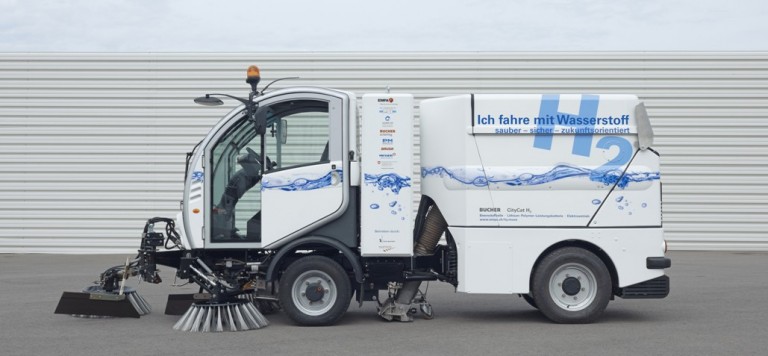Sweeping Industry News Bulletin |
Swiss Street Sweeper Powered by Hydrogen Fuel Cells
For the past couple of years, a street cleaning vehicle has been washing, brushing and vacuuming the streets of Basel in northwest Switzerland. While there's nothing unusual about that, what is noteworthy is that the vehicle, known as the CityCat H2, is powered completely by hydrogen.CityCat Sweeper – April 1, 2012 The street sweeper is part of a project to practically test the feasibility of hydrogen-powered vehicles under real-world conditions. The results from the trial indicate that – although hydrogen-powered vehicles can save energy, are environmentally friendly, and technically feasible – the prices of fuel cells, pressurized storage tanks and electric drives must all drop significantly before such vehicles are cost-effective.
"It became clear relatively quickly that the fuel cell system, which had been developed as a one-off specially for the project, was not yet ready for use in a real-life setting," explains project leader Christian Bach, head of Empa's Internal Combustion Engines Laboratory. "On top of that, the various safety systems kept interfering with each other and bringing everything to a halt." The team replaced the initial fuel cell system with a more mature unit and fitted the vehicle with a single centralized safety module. Shortly after these initial repairs, the voltage converter between the fuel cell system and the battery died, and the electric motor drive and two cooling water pumps had to be replaced. Since these components were tailor-made for the vehicle and took some time to be delivered, the vehicle was off the road for some time. However, since returning to the streets in the Swiss summer of 2011, the team says the vehicle has been much more reliable and has only needed to be taken out of service once, due to a defective water pump. In fact, the vehicle has been running so reliably for the past three months that Basel's city cleaning services have been able to use it on an everyday basis just like a "normal" vehicle. Findings of the trialAccording to the project team, over the course of the trial the CityCat H2 consumed less than half the fuel of its diesel-powered contemporaries. Instead of 5 to 5.5 liters of diesel per hour - which equates to energy consumption of 180 to 200 MJ per hour – the hydrogen-powered vehicle consumed only 0.3 to 0.6 kg of fuel per hour – or 40 to 80 MJ per hour. And although the hydrogen used to power the vehicle was produced using fossil fuels, the vehicle still boasted a 40 percent reduction in CO2 emissions when compared to similar diesel-powered vehicles. This would obviously be further reduced if the hydrogen were produced using energy from renewable sources.
According the to project team, the only real practical disadvantage of the hydrogen-powered vehicle was that there wasn't enough waste heat generated by the fuel cell and electric motor to keep the driver's cabin warm on cold days. A heater unit was fitted to the driver's seat to address this. The other big downside was the cost, with the team saying a hydrogen-powered vehicle of this sort is around three times as expensive as a conventional diesel-powered vehicle. However, they point out that the cost of fuel cell systems alone have dropped by a factor of ten in just the past few years, and that this trend is continuing. The Basel trial of the CityCat H2 finished at end of March. On the first of April it is being moved to St. Gallen in eastern Switzerland, where further practical trials will be carried out. This will allow more testing of the vehicle under real-world usage conditions and let the team study how the various components behave as they age.
For more information about this story, contact Christian Bach via email sent to christian.bach@empa.ch; contact him via phone by calling +41 58 765 71 37. Editor's Note: If you have more information about this story, please let us know. If appropriate, we'll add it to the bottom of this page. |
© 2005 - 2021
|
Industry Updates Contents
|